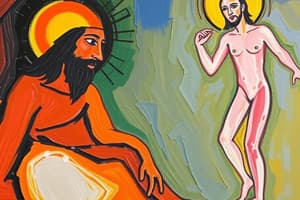Podcast
Questions and Answers
What fundamental concept is established by the belief that every human being is created in the image of God?
What fundamental concept is established by the belief that every human being is created in the image of God?
- Moral compromise
- Inherent worth and dignity (correct)
- Divine favoritism
- Limited creativity
How does being made in the likeness of God affect human identity and purpose?
How does being made in the likeness of God affect human identity and purpose?
- It emphasizes a secular approach to life.
- It suggests that understanding one's purpose is rooted in the divine image. (correct)
- It leads to an identity based solely on social status.
- It implies a rejection of moral responsibilities.
What implication does the concept of moral responsibility carry for humanity?
What implication does the concept of moral responsibility carry for humanity?
- It encourages isolation from one another.
- It promotes accountability for actions that honor God's nature. (correct)
- It reduces the need for ethical decision-making.
- It fosters a sense of indifference towards sin.
What does the redemptive narrative suggest about the image of God in human beings?
What does the redemptive narrative suggest about the image of God in human beings?
What does the cultural mandate entail for humanity's role in creation?
What does the cultural mandate entail for humanity's role in creation?
Flashcards are hidden until you start studying
Study Notes
Theological Implications of Being Created in the Image and Likeness of God
-
Human Dignity:
- Every human being possesses inherent worth and dignity because they are made in God's image.
- This concept forms the basis for human rights and ethical treatment of individuals.
-
Relationship with God:
- Being created in God's likeness establishes a unique relationship between humanity and the divine.
- Humans are called to reflect God's character and attributes, fostering a personal connection with Him.
-
Moral Responsibility:
- Implies a moral obligation to live in a way that honors God's nature.
- Encourages ethical decision-making and accountability for actions.
-
Purpose and Identity:
- Affirms that humanity has a specific purpose aligned with God’s plans.
- Shapes identity, suggesting that understanding one's purpose is rooted in the divine image.
-
Creativity and Free Will:
- Reflects God's creative nature; humans have the capacity for creativity and innovation.
- The gift of free will allows moral choices, reflecting God’s sovereignty and love.
-
Community and Relationships:
- Encourages communal living and relationships that mirror the Trinity's unity.
- Promotes the idea that humans are meant for fellowship with one another and with God.
-
Redemptive Narrative:
- The fall disrupted the image of God in humanity, necessitating redemption.
- Salvation restores individuals to their intended likeness of God, emphasizing transformation.
-
Cultural Mandate:
- Implies a responsibility to steward creation and cultivate the earth in ways that reflect God’s order and care.
- Encourages engagement in cultural, environmental, and social issues.
-
Unity in Diversity:
- Recognizes that all humans, regardless of race, gender, or background, share the same divine image, promoting equality.
- Celebrates the diversity of humanity as a reflection of God's multifaceted nature.
Human Dignity
- Inherent worth and dignity stem from being made in God's image, influencing human rights.
- Basis for ethical treatment and societal values, emphasizing respect for all individuals.
Relationship with God
- Humanity's creation in God's likeness establishes a distinctive divine-human bond.
- Encourages reflection of God’s character, fostering deeper personal connections with the divine.
Moral Responsibility
- Creating humans in God's image signifies a moral obligation to honor God's nature.
- Promotes ethical living and accountability for actions, highlighting a moral framework.
Purpose and Identity
- Humanity is granted a specific purpose aligning with divine plans, shaping identity.
- Understanding one's purpose is rooted deeply in reflecting the likeness of God.
Creativity and Free Will
- Reflects God's creative essence, granting humans the capacity for creativity and innovation.
- The gift of free will enables moral decision-making, illustrating God's sovereignty and love.
Community and Relationships
- Encourages communal living that mirrors the unity of the Trinity.
- Highlights the importance of fellowship among humans and with God.
Redemptive Narrative
- The fall of humanity disrupted the image of God, emphasizing the need for redemption.
- Salvation offers a restoration to the intended likeness of God, spotlighting transformational change.
Cultural Mandate
- Represents a duty to steward creation, engaging with cultural, environmental, and social issues.
- Encourages practices that reflect God’s order and care in cultivating the earth.
Unity in Diversity
- Acknowledges that all humans share the divine image, promoting equality across races and backgrounds.
- Celebrates the diversity of humanity as a manifestation of God’s multifaceted nature.
Studying That Suits You
Use AI to generate personalized quizzes and flashcards to suit your learning preferences.




